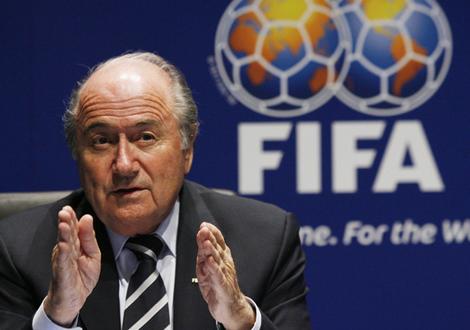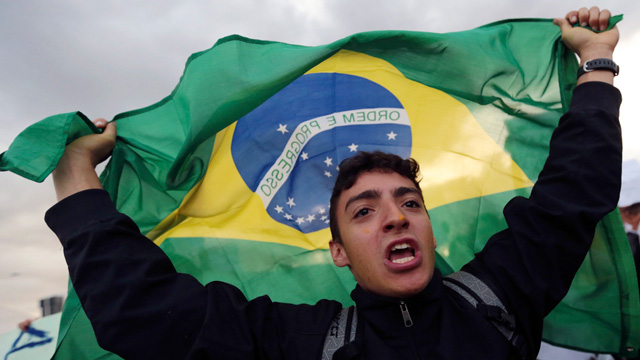The motto of FIFA (Fédération Internationale de Football Association) is For the Game, For the World. While FIFA pretends to have high-minded ideals about soccer, in reality FIFA is a cancerous growth on the body of the sport. Soccer is by far the most popular sport in the world, estimated by FIFA to be played by 265 million people on every corner of Earth. FIFA’s desire to expand commercially, and remain an insular organization, has threatened to permanently tarnish the beautiful game. FIFA has consistently shown to allow, and even encourage, corrupt practises from its executives.
Joga Bonito
12 executive committee members have been accused of some form of corruption since October 2010. ISL, a marketing company that became bankrupt in 2001, bribed top FIFA officials from 1992-2000, including former FIFA president Joao Havelange, Ricardo Teixeira, the head of the Brazilian soccer federation, and then-South American soccer confederation president Nicolas Leoz. All in all, ISL spent an estimated $100 million on bribes over this eight year period. Jack Warner, the former president of North American soccer body CONCACAF, was forced to resign after numerous financial scandals. There is even an ongoing FBI investigation into FIFA’s past.
It is not surprising that corruption has developed because of the money involved. The 2010 World Cup generated over $3.5 billion dollars for FIFA, $1.6 billion of which was spent in sponsorship deals. With so much money under the control of one organization, strong safeguards must be in place to prevent corruption. Unfortunately, FIFA does not possess these. By nature, it is an insular organization that gives enormous power to its regional sub-organizations. Votes are simply favours to be bought – and often are.
The World Cup bidding process had ambiguous rules with regards to the nature of the bidding process. Without clear guidelines, officials were able to exploit the system to their advantage, be they personal or geopolitical. Argentinean delegate Julio Grondona said he would only vote for the English bid if the United Kingdom gave the Falkland Islands to Argentina. Nicolas Leoz tried to barter his vote in exchange for a knighthood. Thailand’s Worawi Makudi wanted the English national team to play Thailand in an international friendly, and to be given Thailand’s domestic rights for the game. Trinidad’s Jack Warner demanded money for two projects totalling $3 million pounds. It is worth noting though that Lord Triesman, the Chairman for the English World Cup 2018 and source of many of the allegations, only revealed them after he had been humiliated in the voting process, receiving a paltry three votes. That Triesman would only reveal the corrupt practices after the vote has taken place suggests that he was willing to go along with much of the corruption until he lost the vote.
[captionpix align=”left” theme=”elegant” width=”259″ imgsrc=”http://natoassociation.ca/wp-content/uploads/2013/07/binhammam.jpg” captiontext=”Former President of FIFA’s Asian Confederation Mohammed bin Hammam. Bin Hammam lost his bid for FIFA Presidency to Sepp Blatter”]
The Damned United
FIFA corruption has thoroughly endemic. The president of anti-bribery non-profit Trace International, who resigned because she was stymied by FIFA in her attempts to investigate FIFA’s corruption, remarked that it was impossible for Sepp Blatter, FIFA’s president, to have remained unaware. Numerous scandals have plagued Blatter’s tenure. His former mentor, Joao Havelange, has been thoroughly disgraced for his involvement in corruption scandals. Between Havelange and Blatter, corruption has become central to FIFA’s existence. Blatter has been a kingmaker in soccer since his election as President 15 years ago. In this time, over four terms as President, his leadership has not been seriously challenged once by other FIFA members. Mohammed bin Hammam, the former President of the Asian Confederation ran against Blatter in 2011, but his campaign was undone by corruption allegations. Bin Hammam’s life suspension by FIFA for the same type of behaviour Sepp Blatter and his cohorts have engaged in shows the dichotomy of power in place.
This type of corruption extends beyond the Zurich’s gilded halls as well. Transnational crime has made soccer a top priority. Interpol stated in February that 680 games were fixed, and it is a problem at every level. The ongoing Gold Cup has seen Belize players approached to fix their soccer game with the United States. By refusing to pressure leagues that have shown themselves unable or unwilling, to fight corruption, FIFA has in essence allowed operations to continue unimpeded. While FIFA is not expressly connected while match-fixing and organized crime, it has done next to nothing to stop organized crime’s encroachment on the beautiful game.
Author Declan Hill’s book The Fix details how easily Asian organized crime syndicates have rigged soccer games in order to profit. In particular, Singapore-based crime boss Dan Tan is known around the world as “the man who fixed football.” Dan Tan’s exploits are only known to investigators because a former associate, Wilson Perumal, came forward to police after the pair had a falling out. Asian gambling exchanges, such as the ones in China, Thailand, Singapore and Malaysia are where the majority of soccer bets are placed. These exchanges do not have any agreements to report illicit betting activity, and therefore are a haven for illegal gambling when compared to their European counterparts.
Corruption in the international soccer establishment has not gone unnoticed. German national team captain Philip Lahm has stated that all the corruption scandals have damaged soccer’s image. Even President Blatter himself has admitted as much. Without significant reforms, FIFA risks alienating the very fan base it needs to sustain its billion dollar operations. This is a shame, as soccer unites more people than any sport on earth. At its best, soccer enthralls and inspires. If only FIFA’s leadership could say the same.




